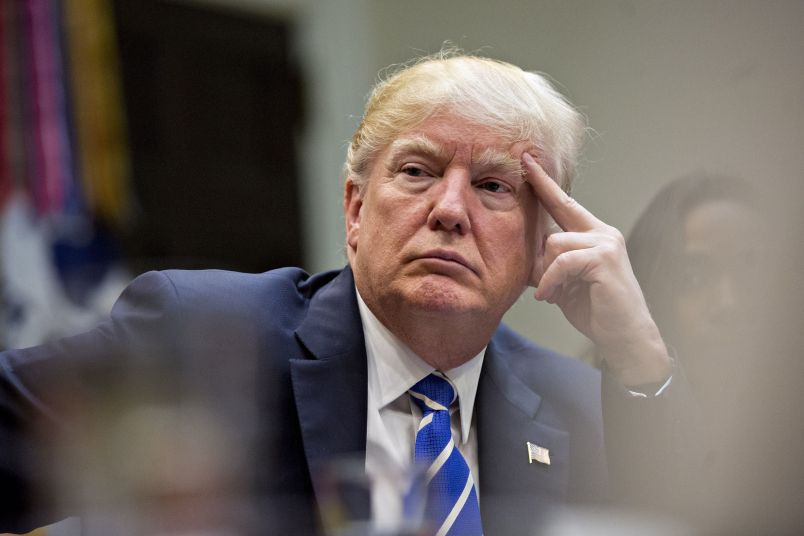The Trump administration announced this week that it will make good on its January threat to claw back funding from so-called sanctuary cities that limit information-sharing with federal immigration officials. Yet hundreds of legal experts say the move would itself be illegal—in part due to a court ruling Republicans cheered just a few years ago.
In 2012, the Supreme Court forced the Obama administration to make Medicaid expansion voluntary for states instead of mandatory, ruling that when the federal government “threatens to terminate other significant independent grants as a means of pressuring the States to accept” a federal policy, it is unconstitutionally coercive.
Conservative groups that celebrated this victory over “infringement on state sovereignty by the federal government” may now be dismayed to learn that it could throw a wrench into the Trump administration’s current plan to punish sanctuary cities.
As much as $4 billion is at stake, funding that supports local programs to tackle human trafficking, sexual assault, gang violence, mental health, gun crimes and safety issues.
“Failure to remedy violations could result in withholding of grants, termination of grants, and disbarment or ineligibility for future grants,” Attorney General Jeff Sessions warned the roughly 600 sanctuary jurisdictions around the country in a Monday press conference. “I urge our nation’s states and cities to consider carefully the harm they are doing to their citizens by refusing to enforce our immigration laws, and to re-think these policies.”
Stripping the cities and counties of this funding, however, is easier said than done. Doing so could violate the 10th Amendment, which protects states’ rights against federal intrusion, and a number of Supreme Court cases, including the 2012 case that struck down Obamacare’s mandatory Medicaid expansion, legal experts warn.
“It may be unconstitutional on several grounds,” said George Washington University Law School professor John Banzhaf III.
Banzhaf argues that U.S. law dating back to the mid-1800s bars the government from “commandeering” local officials to enforce federal law in almost all instances. The 2012 Supreme Court ruling in National Federation of Independent Businesses v. Sebelius expanded on this principle, holding that “states could not be required to expand Medicaid programs under threat of a loss of federal funds—the same coercive method threatened by Sessions—except where the threat was one mandated by Congress and signed into law, not a mere presidential order,” Banzhaf said.
Bolstering the NFIB decision are two other past rulings from the high court.
In the 1987 decision South Dakota v. Dole — which concerned a government attempt to cut highway funding to states that tried to lower the federal drinking age — the Court said the federal government can only cut grants related to the policy they are trying to enforce. Though the federal government’s argument trumped the state’s in that case, the ruling significantly narrowed the kind of funding the federal government can withhold when attempting to incentivize local governments to carry out a certain policy.
“So the DOJ is extremely limited here in what kind of money they can even touch,” explained Grisel Ruiz, a staff attorney at San Francisco’s Immigrant Legal Resource Center. “They can’t take funding that is completely unrelated.”
The Court went even further in 1997, ruling in Printz v. United States that “the Federal Government may not compel the States to enact or administer a federal regulatory program.”
Even before Monday’s announcement, three California sanctuary cities – San Francisco, Santa Clara, and Richmond – sued the government over the threat to their funding.
Ruiz says she is confident the court will find that despite Sessions’ assertions, most sanctuary cities are actually in full compliance with federal law.
“We feel very confident that sanctuary policies are lawful,” she told TPM. “Local governments are generally under no obligation to cooperate with federal immigration officials and they are allowed to dedicate their local resources how they see best.”
There is no one legal definition of a sanctuary city, and a range of policies and practices exist across the country. Some sanctuary policies are purely symbolic and involve no legal changes at all. Some bar all government employees, including police officers, from asking residents about their the immigration status. Some instruct their local jails to refuse “detainers” from Immigration and Customs Enforcement—releasing offenders after they have served their time instead of handing them over to federal officials—unless the person is convicted of a serious offense.
City Council member Sal Tinajero in Santa Ana, California—which voted to become a sanctuary city earlier this year—explained what these policies look like on the ground.
“Let’s say, for example, that you have a person who commits a traffic violation,” he said. “Our police officers will not call ICE and say, ‘We have someone here who is undocumented.’ We don’t want people to fear that they could get pulled over one day going to work and never come back. But if people are being sought out because they committed a violent crime, that’s different. We would cooperate.”
Sessions’ Justice Department asserts that these kinds of practices violates Section 1373 of the U.S. Legal Code, which states that a “local government entity or official may not prohibit, or in any way restrict, any government entity or official from sending to, or receiving from, the Immigration and Naturalization Service information regarding the citizenship or immigration status, lawful or unlawful, of any individual.” Sessions said Monday that the DOJ will now condition all of their grants to cities on compliance with this law.


